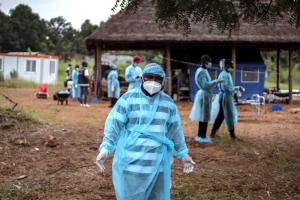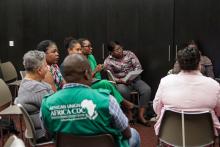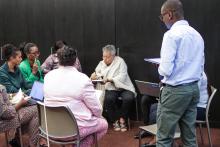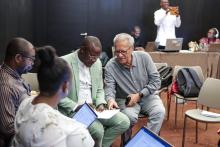Angola takes a significant step toward strengthening public health emergency preparedness and response
Angola, like many countries in the region, continues to face growing threats to public health, including the ongoing cholera outbreak affecting several provinces. In response, the Ministry of Health has taken concrete measures to enhance the country’s capacity to prepare for and coordinate responses to public health emergencies.
A central part of this effort is the establishment of Public Health Emergency Operations Centres (PHEOCs), specialized coordination hubs housed within the National Directorate of Public Health (DNSP) and overseen technically by the Department of Hygiene and Epidemiological Surveillance (DVE). These centres are designed to support timely and efficient multisectoral coordination not only during outbreaks and health emergencies, but also through continuous risk monitoring, event and community-based surveillance via hotlines, and data from the CPDE to maintain real-time situational awareness.
Over the past month, with support from the World Health Organization (WHO), the Ministry of Health led a series of strategic activities to strengthen Angola’s PHEOC system. This included the development and multisectoral review of key governance documents such as the National PHEOC Handbook, Standard Operating Procedures (SOPs), and the Business Continuity Plan (BCP). These tools were validated through a participatory workshop involving national stakeholders and partners.
The process was further complemented by an introductory training on public health emergency management and PHEOC operations, followed by a tabletop simulation exercise conducted from 14 to 17 April 2025. The simulation presented a scenario of extensive flooding leading to a cholera outbreak, allowing participants to test coordination mechanisms and apply the newly developed documents in a realistic setting.
The initiative brought together 30 participants from across sectors, including health, environment, laboratories, civil protection, and the national police, as well as representatives from regional and international partners such as the Africa CDC, the Economic Community of Central African States (ECCAS), and the REDISSE IV project.
According to Dr Walter Firmino, WHO Angola Emergency Officer, Angola has made meaningful progress in operationalizing its emergency coordination systems. “From developing and validating key documents to conducting targeted training and simulation exercises, the country has taken major steps in the right direction. Angola now has a stronger foundation, but sustaining progress will require continuous capacity building, regular testing of coordination systems, and stronger cross-sector collaboration, especially through improved information-sharing mechanisms,” he said.
The initiative has strengthened internal organization and team readiness, as stated by Dr. Claudete Samuton do Francisco, a Department of Hygiene and Epidemiological Surveillance technician at the DNSP.
“This training will greatly help us improve our ability to respond to public health emergencies in a coordinated and organized manner. We also had the opportunity to review and validate the manual and SOPs guiding the PHEOC’s functioning. More importantly, it reinforced the readiness of each team member to fulfill their role with responsibility and efficiency,” she said.
The strengthening of Angola’s PHEOCs is aligned with the International Health Regulations (IHR). It builds on global best practices such as standardized incident management systems, real-time data sharing, and participation in regional knowledge networks.
Through these recent efforts, Angola is making tangible progress toward fully operationalizing its PHEOC system, enhancing preparedness, surveillance, and effective response to future public health emergencies.



